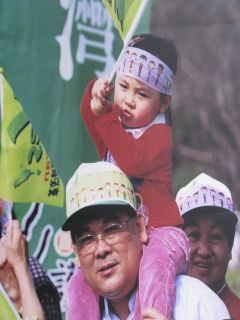Taiwan’s opposition wins all major cities, and KMT suffers an historic blow throughout Taiwan. The election results suggest a change of government in 2016 and a goodbye to KMT government. There are presidential and parliamentary elections in early 2016 and traditionally a strong local base has helped presidential candidates. Historically, this was the case in 1997 for DPP and 2005 for the KMT.
By Michael Danielsen, Chairman of Taiwan Corner
Taiwan’s opposition wins almost all the major cities. New Taipei City is now the only major municipality controlled by the China-friendly KMT government party, winning by a majority of only 1% point over the opposition DPP. Probably the most important impact of the result is that it puts the DPP in its strongest ever position in the lead up to a presidential election, which takes place in early 2016.
One of the primary reasons for the opposition victory is the poor performance both locally and nationally by the ruling KMT party. The population has long been displeased with Taiwan’s economic development, stagnant wages and high property prices. In addition, demands for more openness, social equality and fairness advanced by, among others, the Sunflower Movement during and after the occupation of Taiwan’s parliament in early spring played a role. The Sunflower movement, or more correctly, social movements, have demanded more transparency and better monitoring of agreements between Taiwan and China. This shows a concern about the KMT’s ability or willingness to protect Taiwan’s interests. The election was a massive victory, not only for the opposition party DPP but also for independent politicians and social movements, which now play a major role in Taiwanese politics.
Independent mayoral candidate Ko won the capital Taipei, traditionally a KMT stronghold. DPP wins Taichung, the port city of Keelung and the Penghu islands from the KMT. It was a big surprise that the DPP was able to win Taoyuan located just outside of Taipei. Taoyuan is traditionally a KMT stronghold, but the city has been plagued by for instance KMT corruption scandals. In addition, the DPP wins over the KMT in Hsinchu city and Chaiyi county.
The distribution of cities, big and small, reveals the significance of the election result. The DPP candidates were elected in 13, to the KMT’s 6 (previously 7 and 14 respectively), with 3 wins for independents (previously 1). The opposition will control 5 out of the 6 largest cities, Taipei, Kaohsiung, Taichung, Tainan and Taoyuan.
The election results suggest a change of government in 2016 and thus a goodbye to KMT-led government. There are presidential and parliamentary elections in early 2016 and traditionally a strong local base has helped presidential candidates. Historically, this was the case in 1997 for the DPP and 2005 for the KMT.
One thing is certain, the election results will increase divisions in the KMT further. The party is already divided on several issues including ones related to the aftermath of the three-week occupation of Taiwan’s parliament in March and April. The occupation, which included several thousands of mainly young people ended peacefully and one of the results is that the government cannot ratify the recent trade agreement with China and there appears to be continuing internal conflict concerning the monitoring of agreements with China. This is despite the fact that the KMT 70% of the seats in parliament. Social movements in Taiwan will become an even stronger power. They have worked intensively online and offline during the elections.
Taiwan Corner invited two of the leaders of Taiwan’s Sunflower Movement, Dennis Wei and Wu Cheng, who occupied Taiwan’s parliament, to London and Europe in early November. Taiwan Corner’s Chairman Michael Danielsen attended meetings with politicians in both cities, officials from the Foreign and Commonwealth Office in London and the EU’s External Action Service and academics at the London School of Economics.

Wu Cheng (left) and Dennis Wei (right) in fronnt of the European Parliament in Brussels.
The interest in the Sunflower Movement is increasing in Europe because it is clear that Taiwan may walk a different political avenue in the years ahead in which in social movements and independent politicians have a far greater significance.
We in Taiwan Corner see the election results as a new start for Taiwan’s future and as a strengthening of democracy in Taiwan.





